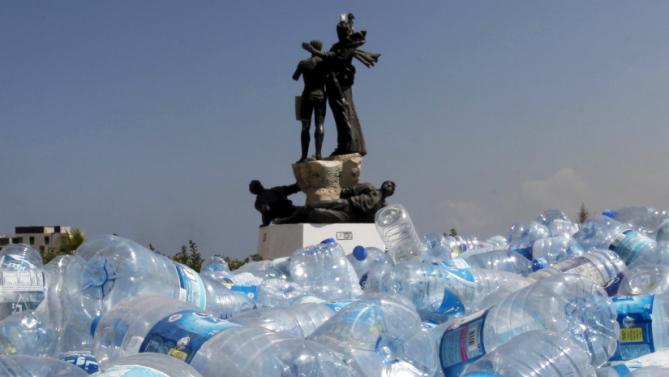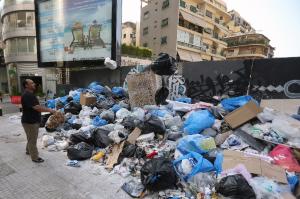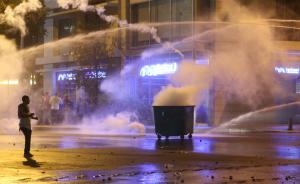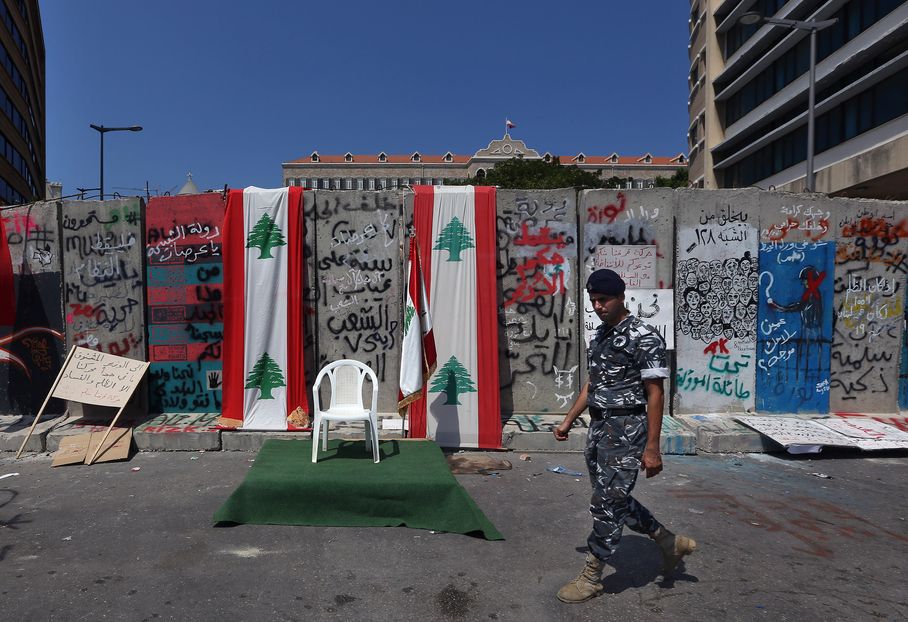
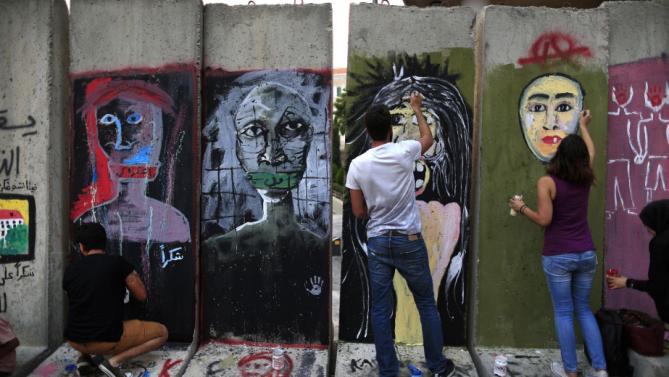
Lebanese activists paint graffiti on the a concrete wall installed by authorities near the main Lebanese government building, a day after violent anti-government protests, in downtown Beirut, Lebanon, Monday, Aug. 24, 2015. Anticipating more protests, authorities installed a concrete wall near the main Lebanese government building, site of the largest protests. Organizers of the "You stink" protests that have captivated the Lebanese capital postponed anti-government demonstrations set for Monday evening after a night of violent clashes with police during which dozens of protesters and police officers were wounded. (AP Photo/Hassan Ammar)
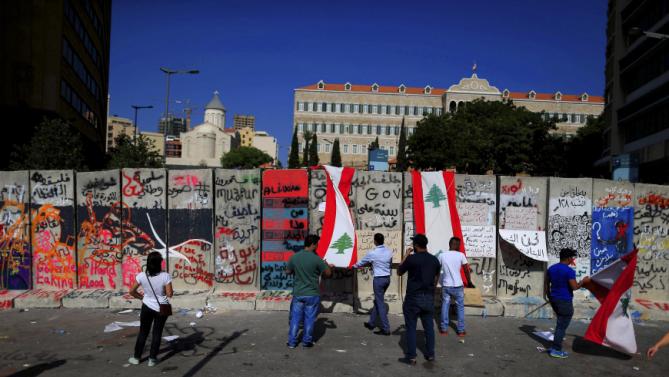
Lebanese activists hang Lebanese national flags on a concrete wall installed by authorities near the main Lebanese government building, in downtown Beirut, Lebanon, Tuesday, Aug. 25, 2015. Anticipating more protests, authorities installed a concrete wall near the main Lebanese government building, site of the largest protests. On Saturday and Sunday nights, police fired tear gas and water cannons at the protesters, battling them in the streets of Beirut in dramatic clashes, wounding dozens. (AP Photo/Hassan Ammar)
Water bottles are gathered to be recycled near a statue in Martyrs' Square in Beirut, Lebanon August 25, 2015. Lebanon's cabinet held an emergency meeting on Tuesday in its newly fortified headquarters after protests over trash collection spilled over into street violence and calls for the feuding government to resign. REUTERS/Jamal Saidi
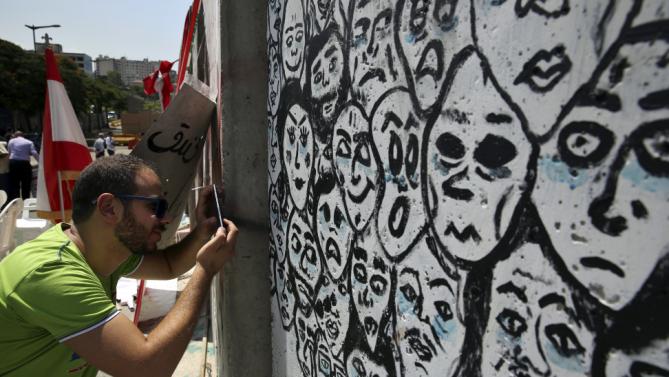
A Lebanese man takes a photograph through a concrete wall installed by authorities near the main Lebanese government building, in downtown Beirut, Lebanon, Tuesday, Aug. 25, 2015. Anticipating more protests, authorities installed a concrete wall near the main Lebanese government building, site of the largest protests. On Saturday and Sunday nights, police fired tear gas and water cannons at the protesters, battling them in the streets of Beirut in dramatic clashes, wounding dozens. (AP Photo/Bilal Hussein)
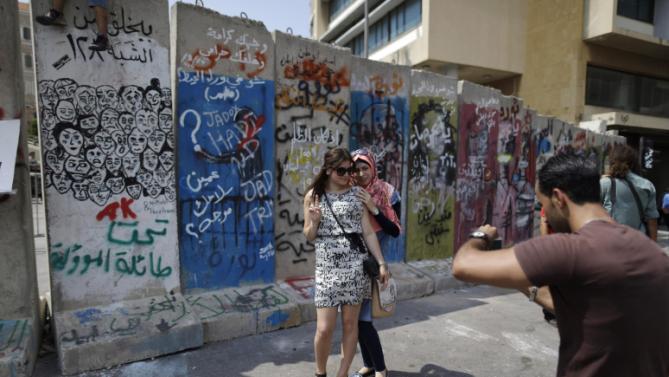
Lebanese women have their picture taken in front a concrete wall installed by authorities near the main Lebanese government building, in downtown Beirut, Lebanon, Tuesday, Aug. 25, 2015. Anticipating more protests, authorities installed a concrete wall near the main Lebanese government building, site of the largest protests. On Saturday and Sunday nights, police fired tear gas and water cannons at the protesters, battling them in the streets of Beirut in dramatic clashes, wounding dozens. (AP Photo/Hassan Ammar)
Al Arabiya:
An emergency Lebanese cabinet meeting on Tuesday has ended in failure in a bid to address the trash crisis amid street violence and calls for the feuding government to resign.
An agreement was reached, however, on cancelling all the tenders from companies to remove the piling garbage that have been previously announced.
Al Arabiya News channel’s correspondent in Beirut confirmed the withdrawal of members from Hezbollah and its allies, the Free Patriotic Movement and the Armenian Tashnag Party in Lebanon from the talks on Tuesday.
Six ministers from the Hezbollah group and its allies withdrew four hours into the meeting. Foreign Minister Gibran Bassil said he was also pulling out because of a "theater" being performed with regards to the trash issue, according to the Associated Press.
BEIRUT (AP) — Ministers of the Hezbollah group and its allies have walked out of a Lebanese Cabinet meeting meant to discuss the country's worsening garbage crisis, reflecting the government's lingering dysfunction despite mass protests. Prime Minister Tammam Salam had called for the emergency meeting after a weekend of clashes between security forces and demonstrators protesting against corruption and poor public services.
The six ministers withdrew four hours into the meeting on Tuesday. Foreign Minister Gibran Bassil said he was pulling out because of a "theater" being performed with regards to the trash issue.
Lebanon's multi-sectarian power-sharing government has been without a president for more than a year, and parliament has extended its term twice without elections.
Beirut (AFP) - Lebanon's cabinet met Tuesday to discuss the country's waste crisis after weekend protests that began in response to the problem of uncollected trash evolved into calls for the government's resignation.
The cabinet meeting is the first since the demonstrations that brought thousands of people into central Beirut to decry government impotence.
The session, headed by Prime Minister Tammam Salam, is intended to discuss awarding new contracts for rubbish collection across the country, including in the capital and its surroundings.
But ahead of the meeting, ministers expressed doubts about the costs of the new contracts, and it was unclear whether the cabinet, which has been deadlocked by political disputes for months, would be able to take any decisions.
Thousands of protesters took to the streets on Saturday and Sunday for demonstrations organised by the "You Stink" campaign.
The protests were sparked by a collection crisis that saw garbage pile up in Beirut and beyond.
The demonstrations have now evolved into an outlet for deep-rooted, broad-based frustration over political stagnation, corruption and crumbling infrastructure.
Over the weekend, Salam acknowledged protesters' frustrations and warned that his government risked becoming irrelevant if it cannot address the public's concerns.
- 'Heading towards collapse' -
"We're heading towards collapse if things continue as they are," he cautioned.
But it was unclear whether Tuesday's cabinet session could solve the problems that brought protesters out for a rare display of non-sectarian anger on a social issue.
The 18-month old government will discuss a list announced on Monday of companies that have qualified for waste removal contracts across Lebanon.
The list, announced by Environment Minister Mohammed Mashnuq, quickly drew fire from activists who said the companies were tied to a range of influential political figures and would charge exorbitant prices.
Several cabinet ministers have also criticised the collection costs.
Lebanon already pays some of the world's highest per-ton waste collection rates, and local media said the companies recommended for the new contracts were set to raises prices even more.
The core of the crisis, which erupted after the closure of the landfill serving Beirut and its surroundings, also remains unaddressed.
When the Naameh landfill closed on July 17, the government failed to identify sites for new landfills or alternative arrangements.
In the absence of a solution, trash began piling up on the streets, until local municipalities started finding temporary solutions -- dumping in empty lots, river beds and even valleys.
Mashnuq on Monday refused to be drawn on where the trash could go.
Local media said that even if a solution was found, it could take up to six months for new contractors to begin collecting and disposing of Beirut's waste.
- 'Corrupt political class' -
On Monday, the leaders of the protest movement said they were regrouping after violence erupted at the weekend demonstrations.
They blamed the clashes on "troublemakers", but also acknowledged that they needed time to organise better.
They called for a new demonstration on Saturday night against Lebanon's "corrupt political class".
"In the beginning, this was a battle over the trash issue... But now there is a general battle against the political class," organiser Marwan Maalouf said at a press conference.
Experts said the protests had become a rare outlet for Lebanese frustrated by an out-of-touch political elite and an atmosphere of impunity.
"People are on the streets because they feel that at every level there is no one there for them," said Maha Yahya, a senior associate at the Carnegie Middle East Centre think tank.
"It's an alarm bell for all the political leadership."
Lebanon has been without a president for more than a year, and parliament has twice extended its own mandate since the last elections in 2009.
The cabinet has been unable to make decisions for months because of deadlock between two main political blocs.
The country has long suffered chronic electricity and water problems and has seen its resources stretched further by an influx of more than a million Syrian refugees.
